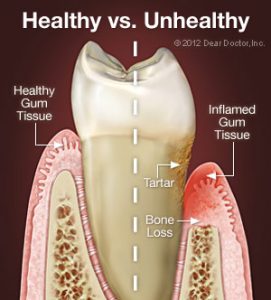Gum Disease – Symptoms and Treatment of Gum Disease

Gum disease is an infection that destroys the supportive tissues surrounding teeth. Infected gums swell, ulcerate, and slough off. A dentist may recommend gum surgery, or other treatment, to correct the gum condition. This treatment may include antibiotics or bone grafting. Regardless of the treatment chosen, good dental hygiene habits should continue throughout one’s life. This article will discuss the symptoms of gum disease and how to treat them.
Inflammation of the gums is the primary cause of gum disease. During this condition, the bacteria found in plaque produce toxins that destroy the bones and connective tissues of the mouth. As the disease progresses, the pockets will deepen, and teeth will become loose and fall out. In the worst case scenario, gums may also become inflamed and bleed easily. Inflammation of the gums is the mildest form of gum disease, and can occur at any age.
There are two major types of gum disease: chronic and acute. The first type is characterized by rapid progression of the disease. It results in the destruction of the gingival tissue, bones, and nerves. The second type is called degenerative, which occurs gradually. The last type is known as necrotizing periodontitis. In this condition, the gingiva is inflamed and resorbs, and the bone is destroyed. In this case, the disease is not curable. The best treatment option is to prevent the disease from getting worse.
The first type is chronic periodontitis. This causes the gums to recede and become painful. In severe cases, there are deep pockets and the bones supporting the teeth are no longer supporting them. Ultimately, this can lead to tooth loss. And, in the worst case scenario, the affected teeth are completely lost. A dentist will need to perform a surgical procedure to repair the damage caused by gum disease. And after the surgery, the patient will need to take antibiotics to prevent an infection from occurring.
Chronic gum disease can progress below the gum line. Plaque bacteria cause an infection that eats away at the connective tissue and bone around the teeth. Over time, bacteria in plaque will begin to cause the gums to pull away from the teeth, forming a pocket between the teeth. If the pockets are deep, this is a sign of periodontitis. This is a serious disease that requires professional teeth cleaning.
Poor diet and oral hygiene can also be risk factors for gum disease. People with poor oral hygiene may have a poor digestive system, which can lead to plaque buildup. Bad breath can be caused by several different medical conditions, including tonsil stones and throat and lung infections. Apart from gum disease, the disease can also be caused by partial or complete eruption of wisdom teeth or by the patient’s mouth breathing. Some other causes of bad breath include partially erupted wisdom teeth, sinus infections, and respiratory conditions.
Inflammation of the gums is the first sign of periodontitis. These gums will be red, inflamed, and may bleed when brushing your teeth. Early periodontitis can lead to bone loss and loose teeth. Ultimately, this disease can lead to tooth loss. And the Centers for Disease Control and Prevention says if you have sore gums, you’re at risk for heart disease. If you are not sure what is causing the inflammation, get examined by your dentist.
Researchers have discovered a potential link between gum disease and a number of other diseases. Taking antibiotics can reduce the risk of heart disease. Infections in the mouth can also affect the immune system, leading to weakened gums. In addition to antibiotics, patients with gum disease are at risk for a number of serious health conditions, including diabetes. However, this condition can worsen an existing condition. This can lead to more complex and expensive treatment.
Periodontitis is a serious infection of the gums. If left untreated, it can lead to tooth loss and increased decay. In severe cases, the infection can cause damage to the bones of the teeth. If you have gum disease, you need to see your dentist immediately for treatment. The sooner you get it, the better. The sooner you seek help and visit the health website cth.co.th, the better. It is very important to monitor your oral health.